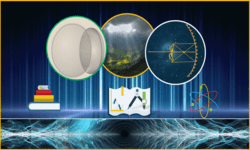



 Tech & IT
Tech & IT
 Business
Business
 Coding & Developer
Coding & Developer
 Finance & Accounting
Finance & Accounting
 Academics
Academics
 Office Applications
Office Applications
 Art & Design
Art & Design
 Marketing
Marketing
 Health & Wellness
Health & Wellness
 Sounds & Music
Sounds & Music
 Lifestyle
Lifestyle
 Photography
Photography
More Learnfly
Business Solution Become an InstructorScience systematically explores and understands the natural world through observation and experimentation. It spans disciplines like physics, biology, and chemistry, driving technological advancements and expanding our knowledge of the universe.

By : John Peterson
Where the cloud and the internet lives...
4.7 61006
2:41:40 hrs 6 lectures All Level

By : Taimor Khan
Use of Natural Language Processing, Machine Learning and Sentiment Analysis towards D...
4.2 58599
5:30:4 hrs 68 lectures Intermedite Level

By : Steve Liguori
Understanding the Parallel Resistance Formulas, Parallel Circuit Rules and Parallel C...
4.6 78670
1:16:9 hrs 25 lectures Beginner Level

By : Steve Liguori
Understanding Series Circuit Rules and Series Circuit Math...
4.3 64501
1:42:10 hrs 25 lectures Beginner Level

By : Elite Education
This a HVAC course will teach you how design ducts for any project effectively and sm...
4.8 46930
1:29:28 hrs 6 lectures All Level

By : Ziad Baraka
Break the boundaries by making your own solvers...
4.1 41147
1:26:7 hrs 33 lectures Beginner Level












Learn more topics in various categories at one place. Explore unlimited courses in other categories and up-skill yourself today.

 Jazeb Akram
Jazeb Akram 4.2 771056 Beginner Level

 John Hedengren
John Hedengren 4.1 568974 All Level

 Ranjan Pandey
Ranjan Pandey 4.1 346662 All Level

 Muhammad Ahsan Pervaiz
Muhammad Ahsan Pervaiz 4.2 101264 All Level

 Pieter Vliegenthart
Pieter Vliegenthart 4.6 100852 All Level

 Jerome P.
Jerome P. 4.8 100774 All Level

 Vikas Munjal
Vikas Munjal 4.8 100008 Beginner Level

 Senol Atac
Senol Atac 4.9 99986 All Level

 Avinash A
Avinash A 4.8 99903 All Level

 ExpertEase Education
ExpertEase Education20 Lectures Beginner Level

 Kiran Beldar
Kiran Beldar21 Lectures Beginner Level

 Bazeer Ahamed Mohamed Nishad
Bazeer Ahamed Mohamed Nishad14 Lectures Beginner Level
.jpg)
 Naman kumar Gandhi
Naman kumar Gandhi 8 Lectures Beginner Level
.jpg)
 Naman kumar Gandhi
Naman kumar Gandhi 24 Lectures Beginner Level

 Nour ElAkhdar
Nour ElAkhdar18 Lectures Beginner Level

 Nour ElAkhdar
Nour ElAkhdar12 Lectures Beginner Level
.png)
 Nour ElAkhdar
Nour ElAkhdar19 Lectures Beginner Level

 Nour ElAkhdar
Nour ElAkhdar14 Lectures Beginner Level

 Dr. Kiran Derle
Dr. Kiran Derle29 Lectures Beginner Level

 Dr. Kiran Derle
Dr. Kiran Derle55 Lectures Beginner Level

 Shivkumar Iyer
Shivkumar Iyer8 Lectures Beginner Level

 Edu Mark India
Edu Mark India30 Lectures Beginner Level

 MUSTAFA VARICI
MUSTAFA VARICI80 Lectures Beginner Level

 MUSTAFA VARICI
MUSTAFA VARICI58 Lectures Beginner Level

 Gilad James, PhD
Gilad James, PhD31 Lectures Beginner Level

 Gilad James, PhD
Gilad James, PhD17 Lectures Beginner Level

 MUSTAFA VARICI
MUSTAFA VARICI76 Lectures Beginner Level

 Krunal Shah
Krunal Shah26 Lectures Beginner Level

 John Peterson
John Peterson6 Lectures Beginner Level

 Taimor Khan
Taimor Khan68 Lectures Beginner Level

 Sumit Saha (Ph.D)
Sumit Saha (Ph.D)105 Lectures Beginner Level

 Dwijaraja Gore
Dwijaraja Gore17 Lectures Beginner Level

 Steve Liguori
Steve Liguori25 Lectures Beginner Level

 Steve Liguori
Steve Liguori25 Lectures Beginner Level

 Salih Zinaty
Salih Zinaty66 Lectures Beginner Level

 Elite Education
Elite Education6 Lectures Beginner Level

 Ziad Baraka
Ziad Baraka33 Lectures Beginner Level
Science is a systematic enterprise that builds and organizes knowledge in the form of testable explanations and predictions about the universe. It involves the observation of natural phenomena, experimentation, and the formulation of theories to understand and explain the workings of the physical and natural world.
Science is crucial for advancing human understanding, solving problems, and making informed decisions. It drives technological innovations, contributes to medical breakthroughs, and addresses environmental challenges. Science provides the foundation for evidence-based decision-making in various fields.
Main branches include physical sciences (physics and chemistry), life sciences (biology), earth sciences (geology), and social sciences (psychology, sociology). Each branch focuses on specific aspects of the natural world and human behavior.
The scientific method involves making observations, formulating a hypothesis, conducting experiments, collecting data, and analyzing results. The process is iterative, with the goal of refining and improving our understanding of natural phenomena through evidence-based reasoning.
Technology has greatly accelerated scientific progress by providing advanced tools for observation, experimentation, and data analysis. Technologies such as microscopes, telescopes, and computational models have revolutionized scientific research across various disciplines.





